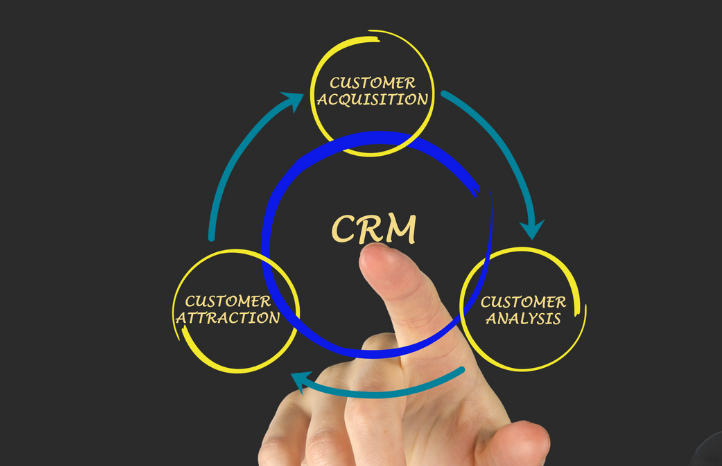
There comes a point where managing hundreds of spreadsheets to manage your customer database, jumping from one document or system to another to locate lead or customer data, or navigating sales opportunities by reviewing scribbles on Post-it notes is no longer an option.
Customer relationship management (CRM) is a software framework that assists business owners in nurturing relationships with their customers. Along the way, a CRM will help with organization, productivity, time management, and impressing clients.
CRM software has been around since the mid-1990s, but it has only recently come into its own. CRM platforms are sophisticated systems that bring together all of the sales leads and customers’ information in one location. All calls, emails, and meetings are recorded and analyzed by a CRM, which helps enhance customer support, boost sales, and increase revenue.
Any customer information system, whether cloud-based CRM or CRM applications on your computer, must be able to handle contacts on a large scale. From leads to business associates, you want to be able to store and handle data for all types of contacts.
To monitor these kinds of relationships, many small businesses still rely on spreadsheets, inboxes, (or sticky notes!) However, at some stage, such “systems” will be unable to keep up.
Here are 5 Points to Consider Before Choosing Your CRM System
1. Decide on CRM deployment: Cloud vs. On-premise:
Whether you decide to go with the cloud-based CRM or on-premise CRM system both have some pros and cons of their own.
With a Cloud (SaaS) solution, you don’t need a server or technical expertise on your side. You simply use your Internet browser to log into the cloud-based CRM and you’re good to go. All data is stored on the vendor’s server.
You must, however, be online at all times. You will be unable to access your data if your Internet connection fails.
With an On-premise solution, You own the app and it is physically hosted at your place. If you want to connect with other customer applications, you’ll have direct access to the servers. You just won’t have to worry about recurring subscription fees.
However, you’ll need to hire in-house IT staff and buy the requisite hardware and software, as well as pay more upfront.
2. Know what features and functionality you need:
In terms of processes, customer base, and growth dynamics, every business is special. As a result, sticking to a set of regular, simple, or inflexible functions is a bad idea. A scalable CRM solution is exactly what you need!
As your company expands, so will your CRM requirements. As a result, you must ensure that the CRM solution you choose can be easily upgraded to a more advanced version.
Another factor to keep in mind is that CRM software often includes a large number of features to cater to a wide range of businesses. But why should you pay for features you don’t need or use?
3. Make sure the system integrates with other applications:
This is one of the most crucial factors to consider when selecting a CRM for your business.
You aren’t purchasing a CRM to add to your list of various work systems. You’re purchasing it to aid in the streamlining of your company’s operations!
As a result, you must ensure that the CRM system you choose will work with the other applications you already have.
4. Request a demonstration:
Never trust a CRM device on its face! It’s always a good idea to put something to the test.
Starting with a live (or online) personalized demonstration and then moving on is the best option.
A salesperson takes you through the app and shows you how to use it during a live demo session. After that, you can ask specific questions about your business.
After that, you can begin “playing” with a CRM to get a better understanding of how it functions and to assess the system’s strengths and weaknesses. Consider things like ease of use, main functionality, and expansion potential.
5. Pay attention to user experience:
One of the most important factors to consider when selecting a CRM system is how you feel and what you experience when using it.
Does it help you? Is it logical? Is there something that irritates you or causes you to slow down?
For example, you may request the vendor to demonstrate how many clicks are required to complete a particular task. As you watch, consider the following questions: What is the effectiveness (and enjoyment) of the user interface? Are the buttons clearly labeled? Is the sequence of events logical?
Most of this is referred to as user experience.
So, when you’re watching a demo or trying out a CRM system, pay attention to the user interface and how easy it is to use.
Conclusion:
CRM is undeniably essential to every company’s success.
It’s always a good idea to map out your needs and requirements, as well as your budget, to find the best solution, regardless of the size of your business.
Even if your organization doesn’t need all of the features and gadgetry that a CRM system provides at first, that doesn’t mean you won’t need additional, more advanced functionality in the future.
It’s also easy to get caught up in all the great things CRM can do for your business, but tread carefully. When choosing a CRM, the most important thing to remember is to keep it straightforward. Begin small and expand as your company expands.
Do you need a CRM system?
Contact us at [email protected] or you can also reach us at +91 8140297820.



